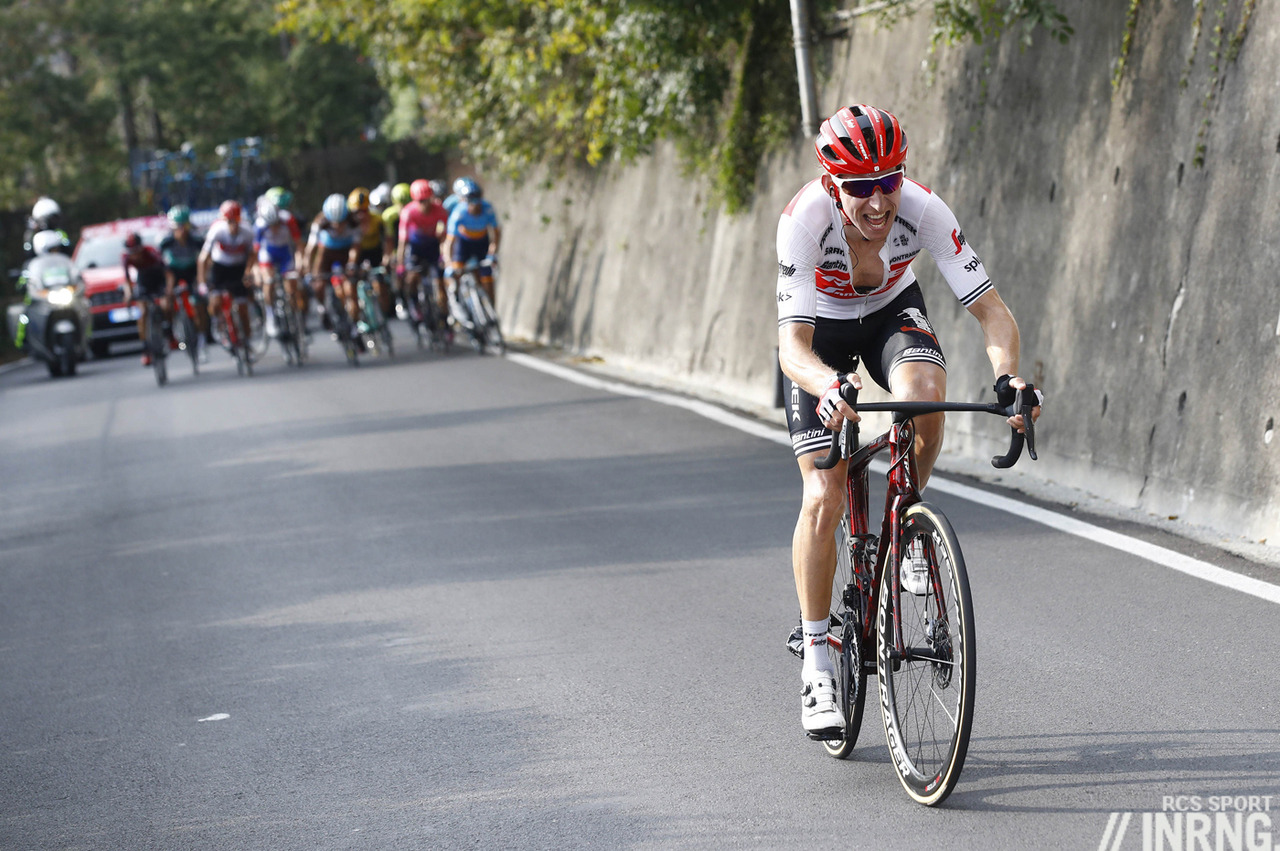
In the late autumnal sunshine on the Civiglio climb Bauke Mollema’s attacked and quickly got a gap as the pre-race picks hesitate, each privately hoping someone else would close him down. On a day when the sports headlines were dominated by Eliud Kipchoge’s paced marathon run, here was Lombardia reminding us that cycling is a relative contest rather than a test of absolute performance.
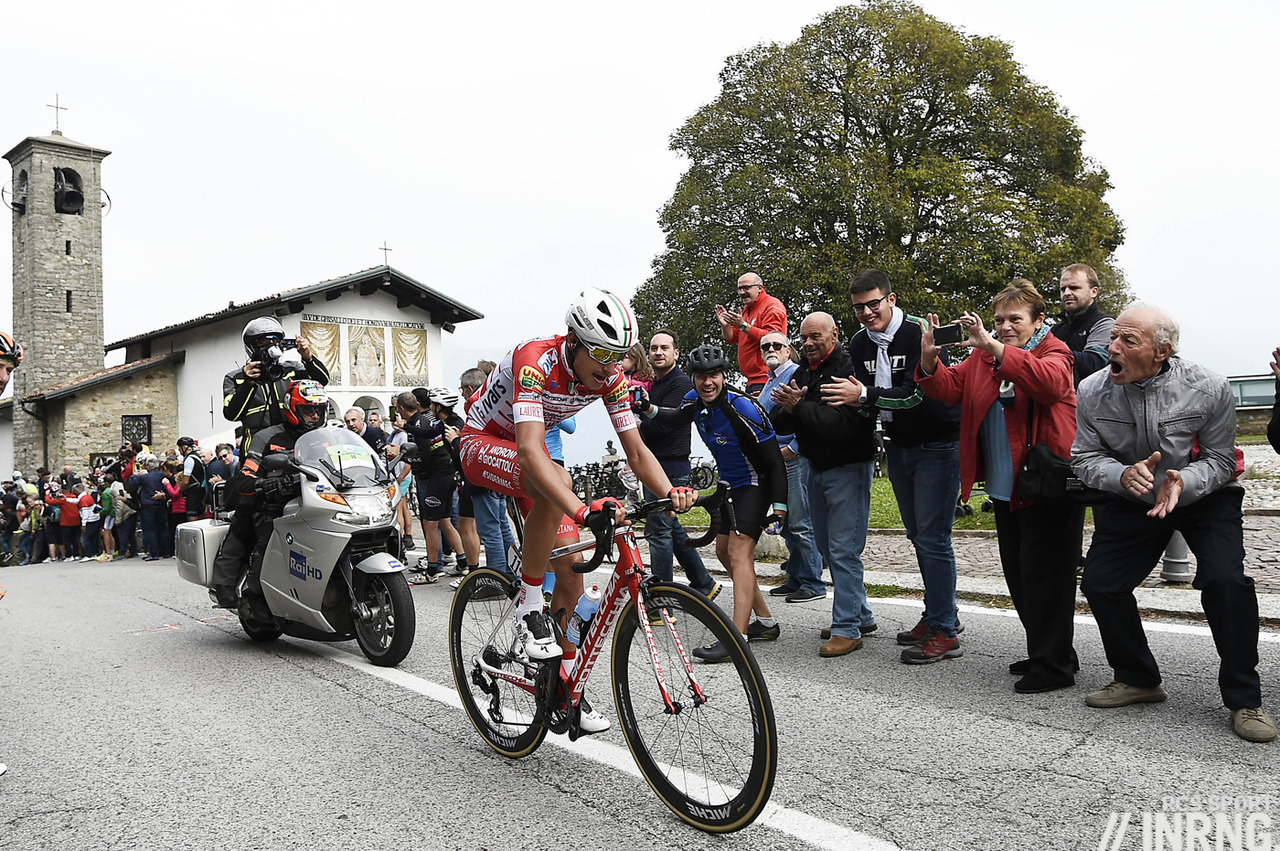
The early break splintered as soon as it hit the climb of the Madonna del Ghisallo with Fausto Masnada going first past the chapel and its peel of bells and Toms Skujiņš linked up with him over the top. The pair made it together to the next climb of the Sormano but were overhauled by Bob Jungels who was out to build up a buffer ahead of the steep climb. Behind the familiar sight of Team Ineos on the front of the bunch. The Muro di Sormano shattered the field but only just. It’s severe – Jungels went in with 30 seconds’ lead, and out over a minute down – but a sizeable group of riders crested the top together and coalesced on the descent. Only who was there? For a long time it was impossible to know who’d made this group because the descent is too technical for the TV cameras go to near the riders. It seems pointless to transmit live watts – spoiler: elite riders pedal hard – when the basics like identifying the riders in the front group elude the production.
Tim Wellens and Emanuel Buchmann went clear on the coastal road and let their team mates behind sit tight as Jumbo-Visma took up the chase and deployed three riders to race into the foot of the Civiglio climb. Was Primož Roglič going to attack? It looked like it but the first thing to happen on the climb was Vincenzo Nibali coming to a halt after a touch of wheels and then being dropped. David Gaudu and Michael Woods launched on the steep section but their move didn’t last long.
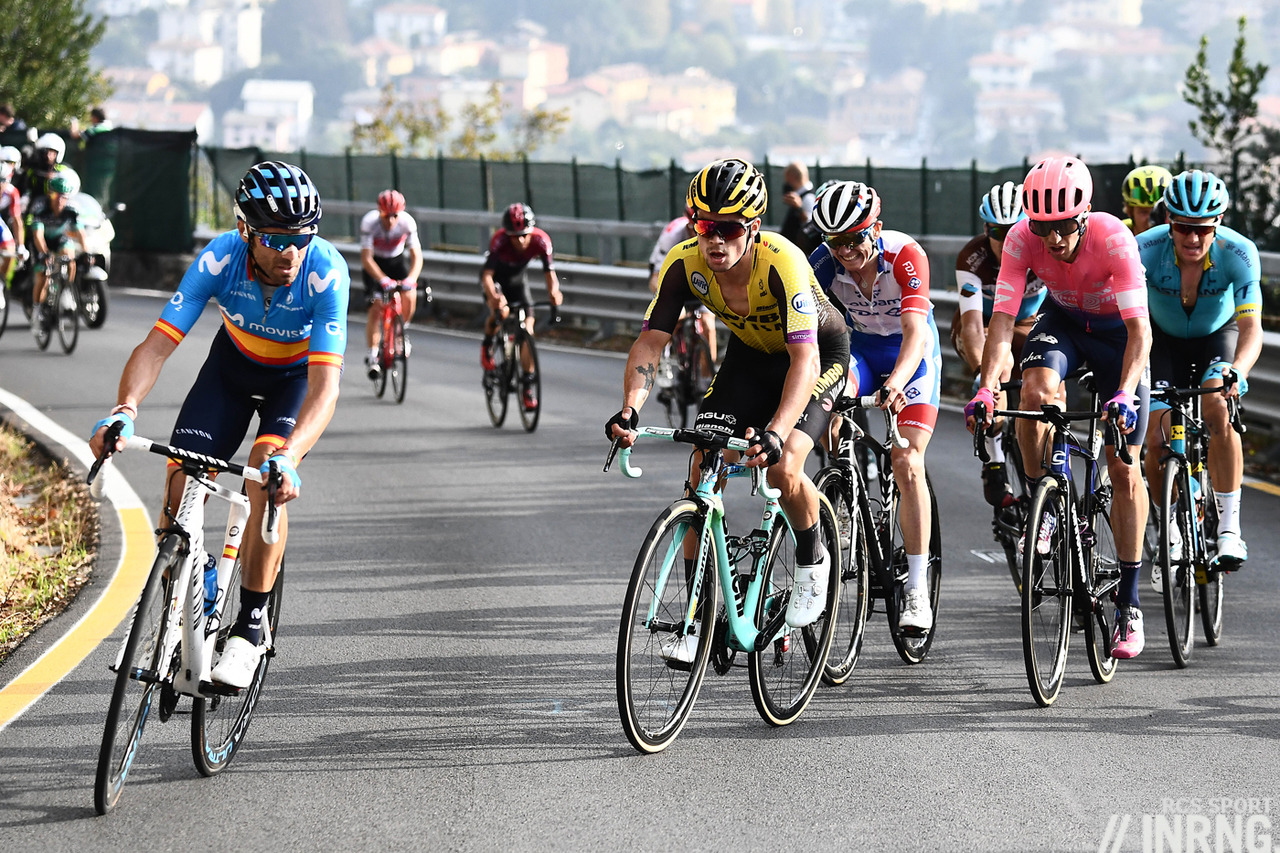
Suddenly Alejandro Valverde attacked, an unusual move for someone who often surfs the wheels but perhaps he sensed it was time to force a selection? The others couldn’t afford to let him go and Valverde was brought back but the chase split the group and several riders were distanced. One was Bauke Mollema but he was able to claw his way back just as the others took a breather. Moments later Mollema made his move just when others couldn’t and just when he could. Helped by the presence of team mate Giulio Ciccone he launched on the flattest part of the climb meaning he could power away like a time triallist rather than match the others in a climbing contest. With 18km to go he quickly got a gap as the group spread across the road, a visible clue nobody wanted to chase. A pro for a decade Mollema’s an infrequent winner but once he gets a gap he’s very hard to pull back and 10 of his 12 career wins until had been obtained solo. Perched diagonally on the bike and nodding like an oil pump this not the most obvious tribute to the mellifluous Felice Gimondi but it was working and his lead quickly reached 30 seconds, and then over a minute as the TV screen graphics got too excited.
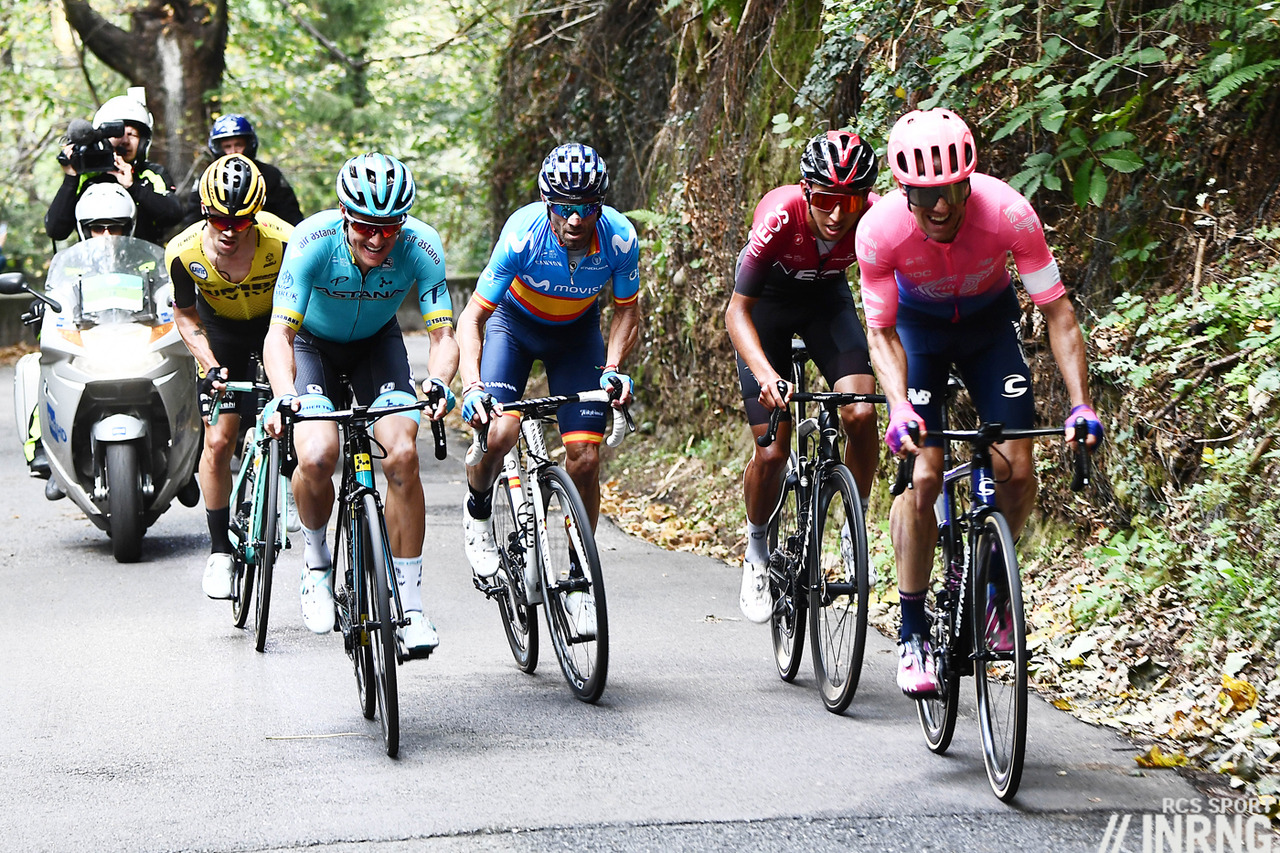
The chase behind was more a collection of solo efforts. Pierre Latour, Michael Woods, Roglič, Valverde and Egan Bernal all launched moves rather than swap turns on the front. That’s the benefit of a move like Mollema’s, the others had to cooperate to bring him back but whoever worked the hardest in the chase stood to lose the most. Mollema had time to enjoy the final kilometre, sit up and celebrate while behind Valverde came in for his third second place ahead of Bernal and Fuglsang.
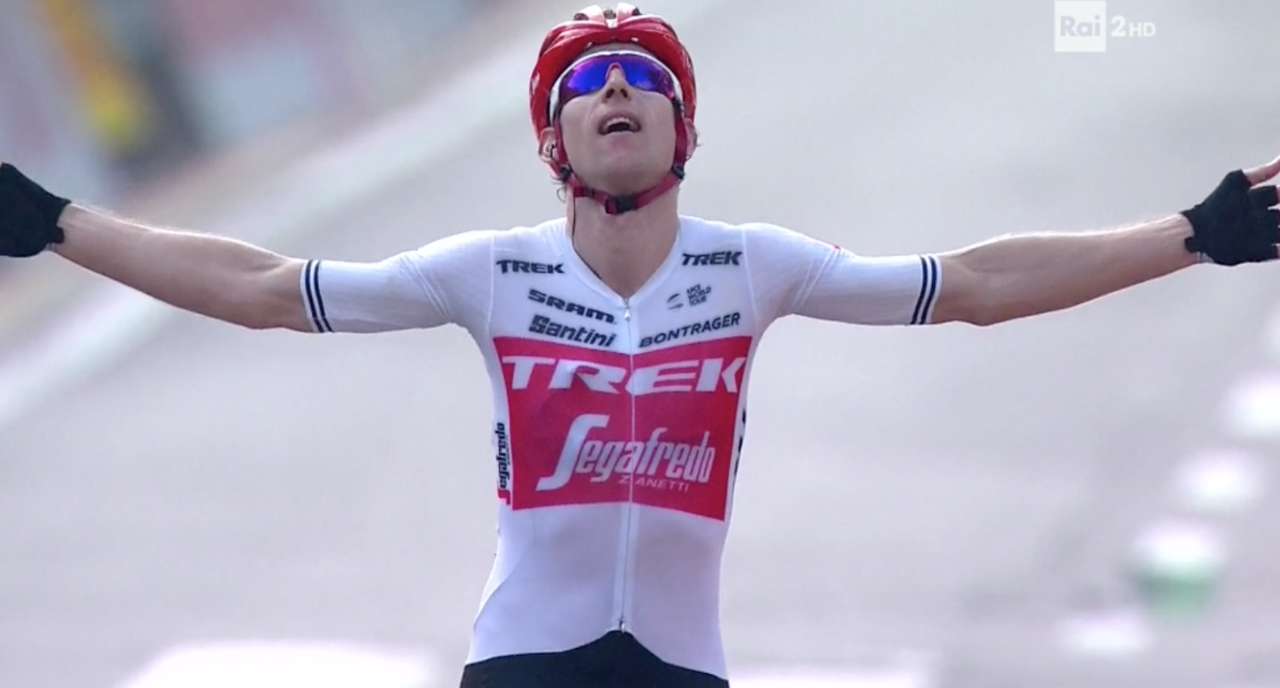
The Verdict
Last year’s race with the action from the Sormano onwards set the bar high and this year’s vintage wasn’t as bubbly. It wasn’t until the Civiglio climb that the outcome of the race was in play. Mollema perhaps had one card to play all day but got his timing just right. The more the others stomped on the pedals behind, the more certain his win got as it showed the cohesion had gone out of the group while Mollema could stop thinking about tactics and focus on trajectory instead. Mollema lands his biggest win and his most valuable, a Monument he’ll be remembered for and it’s been a big year, he gets 500 UCI points for this and was fifth in the Giro this year with 380 points. The point here isn’t to compare these results nor their points, more Mollema is an invaluable Swiss army knife for his Trek-Segafredo team who can have a tilt at the Giro in May, start as a super mountain domestique for Ritchie Porte in July and then bag a Monument in October.
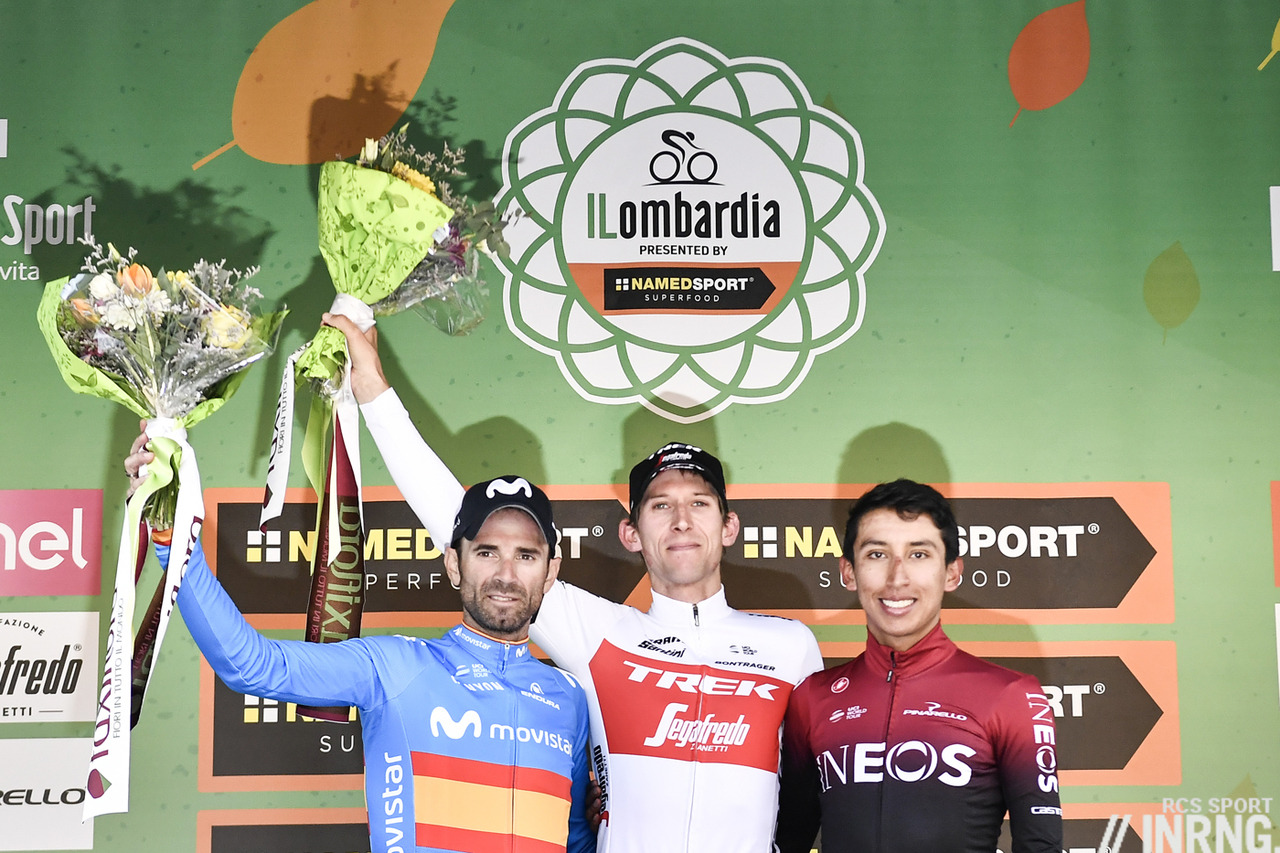

Quite a bad tempered comments section yesterday!
Starting on a more positive note: really enjoyed the race and loved Mollema winning. Great rider who’s not the best at any discipline but richly deserves his day in the sun. Two thumbs up.
nicely summarized.
With all it’s nuance, this has to be one of the best sports, to participate in or follow, in the world.
I feel slightly aggrieved by Inner Ring’s comment on Kipchoge though; we’re talking of a historical threshold being breached with the sub 2 hours marathon. He ran over 13 mph or 21 kmph, an average speed that many of us mortals may pedal on a weekend ride. A runner being the best he could be.
And to compare that to a cycle race where the strongest, and favourites, can’t cooperate to win is slightly odd too. I always leave a race like this feeling a little downhearted.
It’s a nuance of the sport, and you have to accept it, but I’m never fully satisfied when it happens?
A great effort by the runner but he hit a pace and held it. Mollema would never have won Lombardia this way. Hopefully people can enjoy both varieties but I thought Mollema’s triumph was quite a contrast.
As always I love the inrng’s writing, this line ‘cycling is a relative contest rather than a test of absolute performance’ stands as one of my all time favourites. A point that defines the difference in a cycling race.
As much as I respect the “hard guys” of the sport, I almost always root for the underdog, the rider who, through racecraft (and sometimes just plain old luck) will, on that day only, beat those faster and stronger than him. It’s the beauty of road cycling.
As for riders not cooperating behind, it’s got to be the only way a solo rider can win on a day like this? On a one-day classic without a summit finish, all-vs-one strategies will always annihilate the one’s chances.
I’ll hold my celebration until someone runs a sub-2 hour marathon time that can be certified rather than this INEOS/Nike sponsored farce. Rumors are the guy used special shoes that are banned in sanctioned competition. I wonder if there was any dope testing as well?
I didn’t realise INEOS were involved. They must have kept a very low profile.
No, not at all. You couldn’t really avoid noticing that they were running the show when watching it. I only saw a brief video as part of an evening news show but even then read their name several times along the course.
Nike Vaporfly shoes are not “banned”, not even the customized version Kipchoge used. But I agree the entire event was a bit of PR stunt, with the special course, pacers, etc. It doesn’t count as a “world record”.
Pacers or not, it’s an extraordinary accomplishment. Only *once* was I ever able to run a mid 4:30s mile during high school. It’s mind blowing that Kipchoge could run 26 consecutive miles at that pace.
But — what an elite WT pro or GT winner is capable of, is also mind blowing to mere, mortal, amateurs — even highly trained amateurs.
I am in no way arguing, only pointing to a few facts: Kipchoge, absolutely, set a world record. amazing and bravo; sponsored by Nike and Ineos, this is how they planned to do it: https://www.wired.co.uk/article/eliud-kipchoge-ineos-159-marathon
In most of the world population’s understanding of a bike race, 150+ cyclists get on their bikes and go full gas until the finish line. If that were the only contest, I doubt that many would sign up.
It’s the PSYCHOLOGY of a bike race that is much more important than the ability to go full gas all day. Add to that the ever changing disparity in each cyclist’s form, the differences in their individual skillset (Valverde is the best sprinter of the climbers, etc.), their individual goals for each race (with a start list of 175, fewer than 10% have winning as a target goal), teammates support, DS’s inteligence (In the days before radios, after Mollema’s break, there is a group of some of the greatest professional cyclists, brains whirring like supercomputers, trying to calculate the odds of their options. Imagine yesterday, the cacophony of stereotyped accents yelling into each riders ear… they should publish the converstations, just like F1), LUCK, food and sleep (one extra slice of bologna can effect the end of your day).
It is so complicatedly nuance that a person who follows every race, every team and every rider for season after season makes a very logical prediction and then Bauke Mollema wins instead by such a margin that he can sit up, soft peddle and wave to the crowds for the last stretch to the line.
It’s right up there with everything else that makes being a human on planet earth so much fun.
https://www.rt.com/sport/470811-eliud-kipchoge-marathon-tarnished-technology/
There’s surely a running website to discuss this. I’ll zap further arguments over it.
Dude won a 240km Classic solo by attacking an elite group of favourites 20km from the finish.
If you want more than that, maybe cycling isn’t your sport.
“Perched diagonally on the bike and nodding like an oil pump” perfectly describes this guy! My wife kept turning her head away from the TV every time they zoomed in on his escape. But BRAVO to him, as ghastly as he looks on the bike, there are (thank gawd) as yet no score cards for style points, it’s just the first racer across the finish line. The big favorites just sat there, probably figuring Mollema would fade and end up 5th as usual -which points out the folly of UCI points. 5th at the Giro is worth more than a win at one of the 5 Monuments!?!?! Who thought this up – Hein Verbruggen?
Dutch sports commentators nowadays use the term ‘Molle-malen’, as a description of his riding style, ‘malen’ being the Dutch verb for ‘to grind’.
He should promote the chamois butter he’s using. Must be a hell of long lasting product as his derrière would otherwise be raw like … after any race of similar duration.
A correction, Il Lombardia win is worth 500 UCI points.
You’re right, will edit the number and text above.
Surely the joy of cycle sport is that the best rider doesn’t always win. The contest is complicated by ego, by knowledge, by the weather, by the road.
If we wanted to find the best rider we would look to a lab. The best racer wins. A small difference but give an Alaphillipe over a Groove every time.
Froome not Groove.
Cos Froome doesn’t race, of course…
I’ve always enjoyed athletics particularly , and sports generally, but is road cycling the only one where competitors can compete not to win, which is what effectively happens on occasions?
Yesterday was perhaps one such occasion.
My faith in cycling has been reaffirmed however by Jelle Wallay’s near 50km solo break in Paris-Tours which feels different than the manner of Mollema’s Lombardy win?
The differences in outcomes can be very subtle in cycling.
It’s rolling game theory. Not a novel observation but road cycling is basically an applied prisoner’s dilemma where riders will frequently make selfish decisions, even if the result is “worse” than cooperating. There’s a reason “you need to be prepared to lose in order to win” is a common commentator’s cliche.
Zwift?
I’d argue that the best one won yesterday in Como. It was a climb with 10% average grade where he escaped. Slipstream doesn’t matter there not even for the pros. Nibali is the KOM holder for that climb and he averaged 19,4 kph when setting up that time. If anyone had the power to go after Mollema he simply could have done that and didn’t have to care if anyone was riding in his – non existent at that speed – slipstream. It showed that no one besides Mollema was able to really make a difference.
And reading between the lines of some statements favorites gave after the race they seemed to think the same: The hands down strongest rider won.
I like Mollema, as ‘Dan Martin’ as he looks on a bike he makes races interesting by having a go. On the days when everyone else just looks around he deserves to be rewarded. Aside from the fact that he was too scared to go to Italy for many years maybe that’s why Valverde has never won this race. It’s rarely a group finish and rewards attackers. I still think the Muro-Civiglio finale is too hard, it’s all a bit slow motion. Yesterday versus the 2009 finale which is on YouTube illustrates my point.
Currently watching the puncture filled finale of Paris-Tours which has been side stepped by most of the none French World Tour teams. Got to love these novelty finales.
As a huge Bauke fan, I can say yesterday was certainly one of the best races I’ve seen this year. An armchair experience screaming at the box because my rider, an underdog, usually overlooked, had taken a small advantage into the finale…. now could he hold on? As Inner Ring points out 10 of 12 of his victories have been scored this way. Why should we take credit away from Mollema because those behind underestimated an in-form rider, and looked at each other? He still did a great job finishing off that attack. He put himself in a position to win and executed it. Well done! He had shown good form all week, and I’m especially pleased he had the opportunity to (co-)lead the team in races this week. Trek put faith in him and he delivered perfectly.
A jack of all trades, but a specialist of none…. now a monument victory will be on the palmares forever… chapeau!
Oh and yes, his riding style isn’t that graceful or subtle.. but it does lend itself to being compelling at the same time – he looks a few pedal strokes away from blowing up completely whenever he does these full gas off the front escapes. You would never describe him as riding effortlessly away like certain other big names!
I love it when someone wins because none of the favorites have any domestiques left and they all start looking at each other to do the dirty work. Cycling is the only sport I know where you see such game theory at work.
It’s not a sign of an undeserved winner. It’s a sign of and underestimated winner, that’s something else. And it takes a combination of a good sense of tactics, strong legs and commitment.
With Nibali coming on board next year, Mollema probably felt the pressure to win big now, and rode accordingly. Chapeau to the Grinder–Segafredo that is!
Nibali to Trek? They frustrate me as they seem to be the team of former glories. Ritchie Porte being example par excellence. Just as I thought they had started to get some young exciting talent. Not to say Nibbles is totally spent, but I cannot see him winning a GT anytime soon, though if he targets one week races he may have some success. Maybe I am writing him off too soon, but he is wrong side of 30 for a grand renaissance. It’s not like he’s had the same consistency as Valverde is recent times.
He’s still a star name in Italy and the move was done at the insistence of Massimo Zanetti, aka Mr Segafredo. A repeat of this year (Giro podium, he bought plenty of people to the road, on TV a lot in May + a Tour de France stage win) would be decent for Trek, it’s more than they’ve got from signing Porte who’s had a quieter season.
I guess I’m trying to express my disappointment that Trek-Segafredo don’t appear to be hiring the sort of exciting young or established talent that will regularly compete. But I understand their budget is not as big as others, but when you think of the budget they’ve spent on Porte it seems ridiculous, yet here they are again with another rider past his best (though arguably still in the frame to win).
https://www.velonews.com/2019/10/commentary/trek-segafredo-ride-into-2020-with-wind-at-backs_501640
I think this puts a rather large dent in your claim, though I agree that Mr. Porte was a waste of money unless selling espresso to Australians was a big goal.
Bauke Mollema became also World Champion some days ago !!!!! We won’t see him in his rainbow jersey. World Champion Mixed Team Relay..
Where does his name come from? Is it a typically Dutch name? It just sounds like quite a strange construct.
Inrng hits the nail on the head once again with his fluid prose: ‘Cycling is a relative contest, rather than a test of absolute performance’. This is why I follow cycling. Although one might say that a GC rider works in the zone of absolute performance it is a matter of sliding fortunes, opportunities and dumb luck – though you have to be in some form to exploit any of it. Consequentially no result is guaranteed, and a winner is like a shooting ember from the furnace of competition.
I’m afraid I have not and will not acknowledge Kipchoge’s achievement while the IAAF slides on doping – not that he will be bothered. The irony that this comes in the same week as Yates, Farah and Salazar all reminded us of its failures should not be lost on anyone.
As I put in my previous post Bauke has never quite lived up to his promise, but this is a deserved win.
The name comes from Molen (windmill)
and Bauke is a traditional Frisian Dutch name.
Yes and don’t names ending -ma (Mollema, Ottema etc) come from Frisia and the north coast?
Yes. Fun Fact: Obama has Frisian roots as well.
Oh, so poor Trump searched in the wrong country all the years. Kenia, Frisya, Cofeve, who wouldn’t get confused.
I think it’s interesting that all 3 grand tours and 4 of the 5 monuments have been won by first-timers. The exception being Gilbert in Roubaix. On first impressions it appears to be an unusual trend…it would be cool to analyse how unusual this actually is, and indeed when did it last occur that the 3 + 5 big ones were all won by first timers in the same season.
I do not agree. The WC was much more a matter of absolute performance than that marathon. Kipchoge could have run some miles more. Everyone at the WC was absolutely spent. That was absolute performance until the body says no. An even better example is how some athletes end triatlons barely crawling over the finish line.
I’m not sure you understand. Inrng is saying that only Kipchoge could have run the marathon under because in absolute terms only he could do it in under 2hrs.
In both Il Lombardia and the WC riders ride in the wheels, saving energy, they also soft pedal because they are saving themselves. The winner is therefore not the one that has the ability to perform the best (the likely result if they did is that other riders would save 30% and beat them on the line having done less work), but the one that in combination with their own abilities has used opportunity to the best effect. The fact that Sagan closed a two minute gap shows this, as does Valverde and Bernal closed the gap to 15 seconds.
Triathlons are close to an absolute performance, but ITTs are cycling’s absolute performance. No drafting, no tactics, no choice but to go and measure your output to be the absolute best you can do.